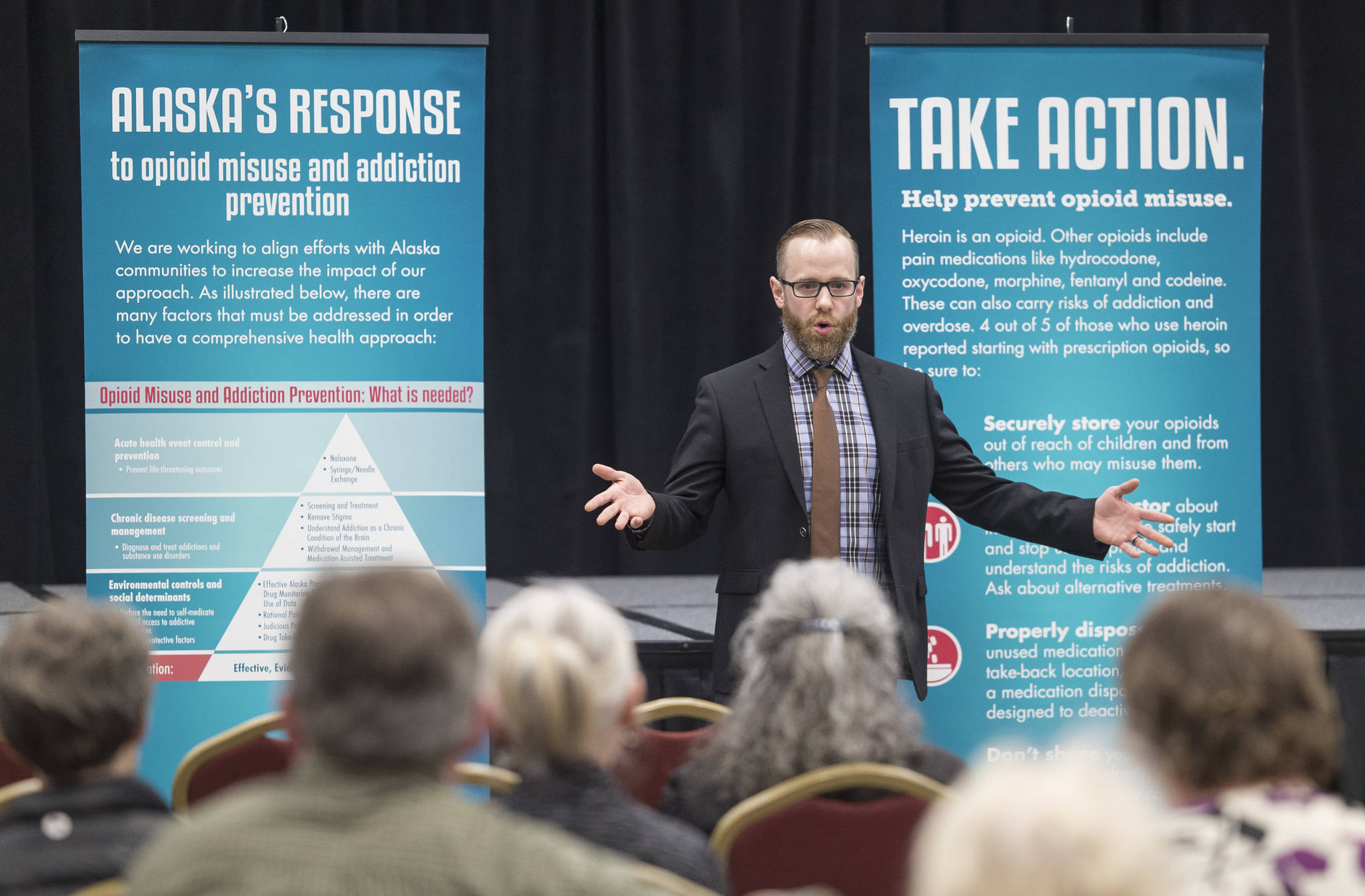Almost everyone in the room had their hand up.
Hope Finkelstein from the state’s Office of Substance Misuse and Addiction Prevention (OSMAP) had asked a room of about 50 people whether they knew someone who struggled from an opioid addiction. When she asked how many of those people knew someone who had died from their addiction, many of those hands stayed up.
With that, the meeting was underway. The meeting, entitled “Your Voice, Your Community,” has been taking place in towns and villages throughout the state, trying to give state officials a look at what kinds of initiatives work for each community in terms of battling the state’s opioid epidemic.
The meeting, which took place at Elizabeth Peratrovich Hall on Tuesday, was facilitated by OSMAP (part of the Alaska Department of Health and Social Services) employees as well as local health care representatives.
“The wisdom is in the community,” Finkelstein said. “We’re trying to match that wisdom with statewide resources and community resources.”
Around 50 people were in attendance, from those working in health care to concerned community members. They divided into small groups, brainstorming about what services were working in Juneau, what barriers there are to getting access to those services, what needs improvement and more.
Gov. Bill Walker also made an appearance. He said community meetings such like this were what he envisioned when he declared a public health disaster on Feb. 14, 2017 regarding the widespread opioid epidemic in the state.
Walker said he’s spoken with governors across the country about how they’re addressing the nationwide epidemic, and has found that Alaska is ahead of the curve on how it’s handling it.
“What I’ve discovered is this: We’re kind of at the cutting edge of this,” Walker said to the group Tuesday. “We’re the ones that now they’re looking to with some of the things we’re doing, and it’s exciting to see that.”
Barb and John Lager, longtime residents of Juneau, were at the meeting and agreed that community members have started to show more interest in stopping the spread of opioid use. They have seen addiction’s effects on people in their children’s age group, they said, and have been keeping tabs on the city’s response to what Barb called a “crisis” multiple times.
“Juneau is starting to come out of its shell,” Barb said, “coming to the realization that it’s happening in every single solitary corner of Juneau, and families are affected.”
Breakout groups at Tuesday’s meeting included talking about alternatives to incarceration and recidivism; screening and treatment; community education and prevention; overdose prevention and syringe exchanges; recovery models; and prescribing and dispensing issues.
Riley Neff Warner, the opioid misuse prevention coordinator for Alaska Partnerships for Success, encouraged attendees to share their experiences and opinions regardless of how involved they are in the world of addiction and treatment.
“It doesn’t matter how peripheral you feel to this issue,” Warner said. “Your insight is incredibly valuable and informs a lot of important initiatives.”
By the end of the three-hour meeting, there were large yellow lined pages that had lists of ideas, observations, opinions and suggestions. Finkelstein said all these lists will be taken into account as OSMAP and partner agencies develop an action plan for the future of fighting the epidemic.
Finkelstein said it’s been interesting to get a picture of how opioids affect communities around the state based on factors such as population, ports of entry or whether the city is on the road system and others. She said one of the main focuses of the meetings is to find out what services are working well in the communities. It’s obvious that there are many problems, Finkelstein said, but it’s important to also get a handle on programs that are working well.
Among those programs working well according to those in attendance is Haven House, a sober-living home for women that helps residents with long-term recovery and reentry after incarceration. The Lagers, who used to run a group home for individuals with developmental disabilities, said they could be interested in following Haven House’s lead and turning their five-bedroom home into a sober-living facility for those dealing with addiction.
Finkelstein’s eyes lit up when Barb announced that idea to the group Tuesday. Barb continued to be adamant after the meeting about the idea.
“We’re committed to this because it’s a crisis,” Barb said. “It’s really a crisis.”
• Contact reporter Alex McCarthy at 523-2271 or amccarthy@juneauempire.com. Follow him on Twitter at @akmccarthy.

